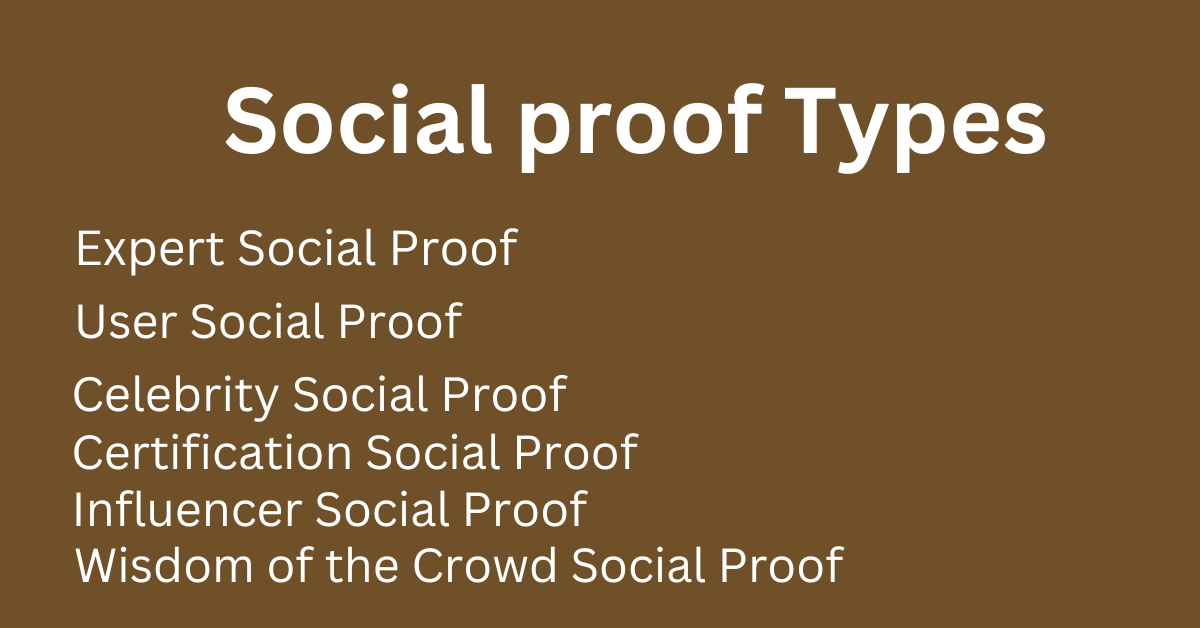Introduction
Social proof is a psychological concept where people rely on the actions and opinions of others to guide their own behavior. It is a powerful tool in marketing, branding, and social dynamics, helping individuals make decisions more confidently. In this article, we’ll explore the different types of social proof, how they work, and why they are essential in shaping consumer behavior.
1. Expert Social Proof
Expert social proof occurs when a recognized authority or expert in a specific field endorses a product, service, or idea. This type of social proof is highly influential because people trust the opinions of those with specialized knowledge. For example, when a dermatologist recommends a skincare product, consumers are more likely to trust and purchase that product because of the expert’s credibility.
Examples of Expert Social Proof:
- Endorsements by Professionals: A nutritionist recommending a particular brand of vitamins.
- Certifications: Products that have certifications from reputable organizations (e.g., organic certification).
- Influencer Collaborations: Collaborations between brands and industry experts or influencers who are well-respected in their field.
Why It Works: People tend to trust experts because they believe these individuals have the knowledge and experience to make informed decisions. When an expert endorses something, it adds a layer of credibility that can sway opinions and decisions.
2. Celebrity Social Proof
Celebrity social proof involves endorsements from celebrities or public figures. Celebrities have a massive influence on public opinion due to their popularity and large followings. When a celebrity endorses a product or service, their fans are often persuaded to try it out, simply because of the association with their favorite star.
Examples of Celebrity Social Proof:
- Product Endorsements: A famous celebrity promoting a new perfume brand.
- Social Media Shoutouts: Celebrities posting about a product or service on their social media platforms.
- Brand Ambassadorships: Celebrities serving as the face of a brand, appearing in commercials, and participating in promotional events.
Why It Works: People often aspire to be like the celebrities they admire. When they see a celebrity using a product, they are more likely to believe that the product is desirable or of high quality. The perceived endorsement by someone they admire gives them confidence in their choice.
3. User Social Proof
User social proof comes from the recommendations, reviews, and testimonials of everyday users. This type of social proof is particularly effective because it reflects the opinions of real customers who have no vested interest in the product other than their experience with it. User-generated content like reviews, ratings, and testimonials can significantly influence potential buyers.
Examples of User Social Proof:
- Customer Reviews: Reviews on websites like Amazon or Yelp.
- Testimonials: Quotes from satisfied customers featured on a company’s website.
- Case Studies: Detailed stories about how a customer benefited from using a product or service.
Why It Works: Potential customers trust the experiences of other users because they see them as impartial and relatable. If many people have had positive experiences with a product, it reduces the perceived risk and increases the likelihood of a purchase.
4. Wisdom of the Crowd Social Proof
The wisdom of the crowd social proof is based on the idea that if a large number of people are doing something, it must be the right thing to do. This type of social proof leverages the collective behavior of the masses to influence individual decisions. It is often used to show the popularity of a product or service, implying that it is a trusted choice.
Examples:
- Best-Seller Lists: Books, products, or services that are labeled as best-sellers.
- High Number of Users: Websites displaying the number of users or subscribers they have (e.g., “Join over 1 million satisfied customers”).
- Social Media Followers: The number of likes, shares, or followers a brand has on social media platforms.
Why It Works: People are naturally inclined to follow the crowd, especially when they are unsure of what decision to make. Seeing that many others have chosen a particular product or service provides a sense of security and validation.
5. Wisdom of Friends Social Proof
Wisdom of friends social proof occurs when individuals are influenced by the opinions and recommendations of their friends, family, or peers. This type of social proof is highly persuasive because it comes from trusted sources within one’s social circle. People are more likely to try something new if it is recommended by someone they know personally.
Examples of Wisdom of Friends Social Proof:
- Referrals: A friend recommending a restaurant or product.
- Social Media Recommendations: Friends tagging each other in posts about products or services.
- Word of Mouth: Informal conversations where people share their experiences with a product or service.
Why It Works: Trust is a significant factor in decision-making, and people tend to trust the opinions of those they know and care about. When friends or family members recommend something, it carries more weight than an advertisement or review from a stranger.
6. Certification Social Proof
Certification social proof involves the use of official seals, badges, or certifications from reputable organizations to establish credibility. This type of social proof is particularly important in industries where trust and safety are crucial, such as healthcare, finance, and technology. Certifications signal to consumers that a product, service, or company has met certain standards of quality and reliability.
Examples of Certification Social Proof:
- Safety Certifications: Products that are certified as safe by regulatory bodies (e.g., FDA-approved).
- Trust Seals: E-commerce websites displaying trust seals like “Verified by Visa” or “Norton Secured.”
- Industry Awards: Businesses showcasing awards or recognitions from industry associations.
Why It Works: Certifications provide a third-party endorsement that reassures consumers of the quality and safety of a product or service. When consumers see that a product has been certified by a reputable organization, they are more likely to trust and choose it over uncertified alternatives.
7. Influencer Social Proof
Influencer social proof is a subset of expert and celebrity social proof but focuses specifically on individuals who have built significant followings on social media platforms. Influencers are often seen as more relatable than traditional celebrities, and their endorsements can feel more authentic and personal. Brands frequently collaborate with influencers to reach targeted audiences and build credibility.
Examples of Influencer Social Proof:
- Sponsored Posts: Influencers promoting a brand’s product or service on Instagram, YouTube, or other social media platforms.
- Unboxing Videos: Influencers creating videos where they unbox and review products.
- Giveaways: Influencers hosting giveaways of products they endorse to engage their followers.
Why It Works: Influencers are seen as trendsetters, and their followers often look up to them for advice and recommendations. The close relationship between influencers and their audience creates a sense of trust and authenticity, making their endorsements highly persuasive.
Conclusion
Social proof is a powerful tool that influences consumer behavior and decision-making in various ways. Understanding the different types of social proof—expert, celebrity, user, wisdom of the crowd, wisdom of friends, certification, influencer, and social proof in numbers—can help businesses and individuals leverage these influences to build trust, credibility, and ultimately, success. By strategically applying the right type of social proof, brands can enhance their reputation, increase conversions, and foster long-term customer loyalty.




